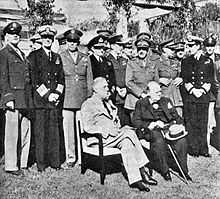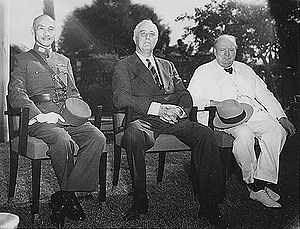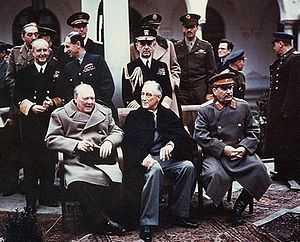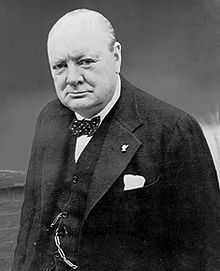List of World War II conferences
- This list is incomplete; you can help by expanding it.
This is a list of World War II conferences of the Allies of World War II. For the historical context see Diplomatic history of World War II.
| Name (CODE NAME) |
Location | Dates | Major participants: | Major results |
|---|---|---|---|---|
| U.S.-British Staff Conference (ABC-1) (ABC-1) |
Washington, D.C. | January 29 – March 27, 1941 | American, British, and Canadian military staff | Set the basic planning agreement for the U.S. to enter the war |
| Atlantic Conference (RIVIERA) |
Argentia, Newfoundland | August 9 – 12, 1941 | Churchill, Roosevelt, Hopkins | Atlantic Charter, proposal for a Soviet aid conference |
| First Moscow Conference | Moscow, USSR | September 29 – October 1, 1941 | Stalin, Harriman, Beaverbrook, Molotov | Allied aid to the Soviet Union |
| First Washington Conference (ARCADIA) |
Washington, D.C. | December 22, 1941 – January 14, 1942 | Churchill, Roosevelt | Europe first, Declaration by United Nations |
| Second Washington Conference | Washington, D.C. | June 20 – 25, 1942 | Churchill, Roosevelt | Make first priority opening a 2nd front in North African Campaign before cross-English channel invasion |
| Second Moscow Conference | Moscow, USSR | August 12 – 17, 1942 | Churchill, Stalin, Harriman | Discuss reasons for North African Campaign over cross-channel invasion, Anglo-Soviet pact on information and technological exchanges |
| Cherchell Conference | Cherchell, Algeria | October 21 – 22, 1942 | American General Clark, and Vichy French officers including Charles Mast | A clandestine conference before the Operation Torch landings, in which some Vichy French commanders agreed not to resist the Allied landings in Morocco and Algeria[1] |
| Casablanca Conference (SYMBOL) |
Casablanca, Morocco | January 14 – 24, 1943 | Churchill, Roosevelt, Charles de Gaulle, Henri Giraud | Plan Italian Campaign, plan cross-channel invasion in 1944, declaration of "unconditional surrender" of Axis, incitement to unify French fighting authorities of London and Algiers |
| Third Washington Conference (TRIDENT) |
Washington, D.C. | May 12 – 27, 1943 | Churchill, Roosevelt, Marshall | Plan Italian Campaign, increase air attacks on Germany, increase war in Pacific |
| Quebec Conference (QUADRANT) |
Quebec, Canada | August 17 – 24, 1943 | Churchill, Roosevelt, King | D-Day set for 1944, reorganization of South East Asia Command, secret Quebec Agreement to limit sharing nuclear energy info |
| Third Moscow Conference | Moscow, USSR | October 18 – November 1, 1943 | Foreign ministers Hull, Eden, Molotov, Fu and Stalin | Moscow Declaration |
| Cairo Conference (SEXTANT) |
Cairo, Egypt | November 23 – 26, 1943 | Churchill, Roosevelt, Chiang Kai-shek | Cairo Declaration for postwar Asia |
| Tehran Conference (EUREKA) |
Tehran, Iran | November 28 – December 1, 1943 | Churchill, Roosevelt, Stalin | First meeting of the Big 3, plan the final strategy for the war against Nazi Germany and its allies, set date for Operation Overlord |
| Second Cairo Conference (SEXTANT) |
Cairo, Egypt | December 4 – 6, 1943 | Churchill, Roosevelt, İnönü | Agreement to complete Allied air bases in Turkey, postpone Operation Anakim against Japan in Burma. |
| British Commonwealth Prime Ministers' Conference | London, England | May 1–16, 1944 | Churchill, John Curtin (Australia), Peter Fraser (New Zealand), William Lyon Mackenzie King (Canada) and General Jan Smuts (South Africa). | British Commonwealth leaders support Moscow Declaration and reach agreement regarding their respective roles in the overall Allied war effort. |
| Bretton Woods conference | Bretton Woods, USA | July 1 – 15, 1944 | Representatives of 44 nations | Establishes International Monetary Fund and International Bank for Reconstruction and Development |
| Dumbarton Oaks Conference | Washington, D.C. | August 21 – 29, 1944 | Sir Alexander Cadogan,Andrei Gromyko,Edward Reilly Stettinius, Jr. and Ku Wei-chün | Agreement to establish the United Nations |
| Second Quebec Conference (OCTAGON) |
Quebec, Canada | September 12 – 16, 1944 | Churchill, Roosevelt, | Morgenthau Plan for postwar Germany, other war plans, Hyde Park Agreement |
| Fourth Moscow Conference (TOLSTOY) |
Moscow, USSR | October 9, 1944 | Churchill, Stalin, Molotov, Eden | Establishing post-war spheres of influence in Eastern Europe, Balkan peninsula |
| Malta Conference (ARGONAUT & CRICKET) |
Malta | January 30 – February 2, 1945 | Churchill, Roosevelt | Preparation for Yalta |
| Yalta Conference (ARGONAUT & MAGNETO) |
Yalta, USSR | February 4 – 11, 1945 | Churchill, Roosevelt, Stalin | final plans for defeat of Germany, postwar Europe plans, set date for United Nations Conference, conditions for the Soviet Union's entry in war against Japan |
| United Nations Conference on International Organization | San Francisco, USA | April 25 – June 26, 1945 | Representatives of 50 nations | United Nations Charter |
| Potsdam Conference (TERMINAL) |
Potsdam, Germany | July 17 – August 2, 1945 | Churchill, Stalin, Truman, Attlee | Potsdam Declaration for unconditional surrender of Japan, Potsdam Agreement on policy for Germany |
In total Churchill attended 16 meetings, Roosevelt 12, Stalin 7.
Code names for some of the major wartime conference meetings involving Roosevelt and later Truman had a partial naming sequence referring to devices or instruments which had an ordinal number as part of their meaning referring to the number of the meeting: 1 ARCADIA, 2 SYMBOL, 3 TRIDENT, 4 QUADRANT, 5 (none), 6 SEXTANT, 7 EUREKA, 8 OCTAGON, 9 ARGONAUT (CRICKET & MAGNETO), 10 and last TERMINAL.
-

Atlantic Conference, Argentia, Dominion of Newfoundland, 1941
-

Casablanca Conference, Casablanca, Morocco, 1943
-

First Quebec Conference Quebec City, Canada, 1943
-

Cairo Conference, Cairo, Egypt, 1943
-

Tehran Conference, Tehran, Iran, 1943
-

Second Cairo Conference, Cairo, Egypt, 1943
-

Yalta Conference, Yalta, USSR, 1945
-

Potsdam Conference, Potsdam, Germany, 1945
References
| |||||||||||||||||||||||||||||||||||||||||||||||||||||||
| ||||||||||||||||||||||||||||||||||||||||||
| ||||||||||||||||||||||||||||||||||||||||||
| ||||||||||||||||||||||||||||||||||||||||||||||||||||||||||||||||||||||||||||||||
Further reading
- What major conferences were held during World War II?, website of the Franklin D. Roosevelt Presidential Library
- United States Army Center of Military History

